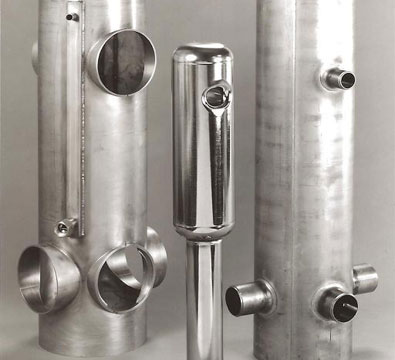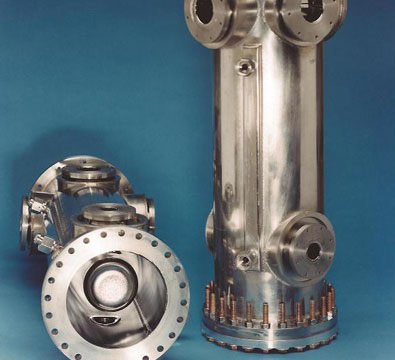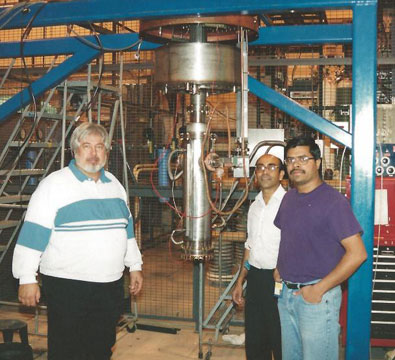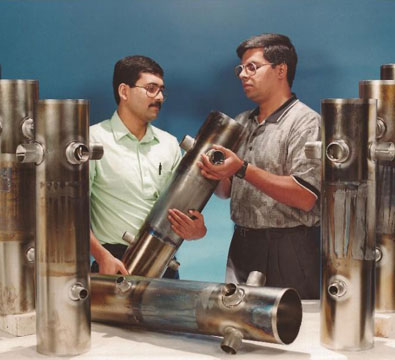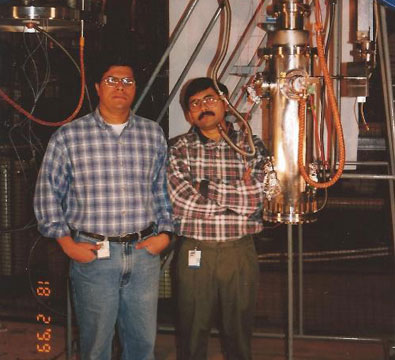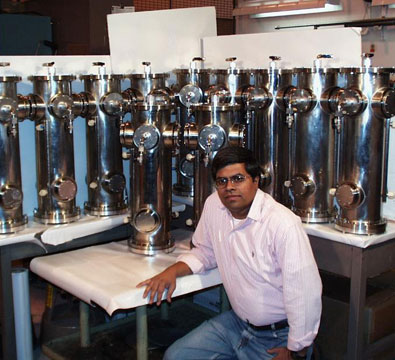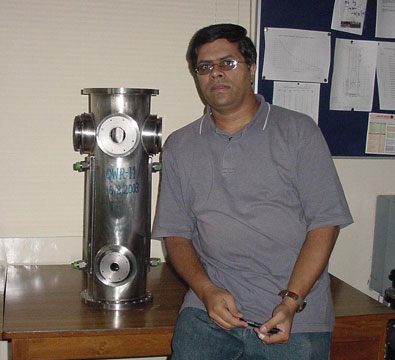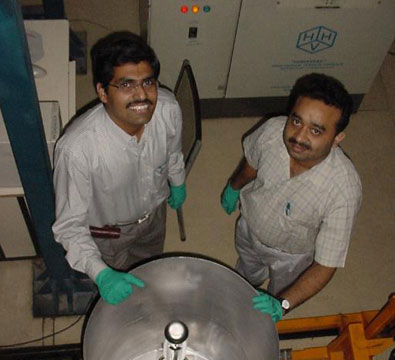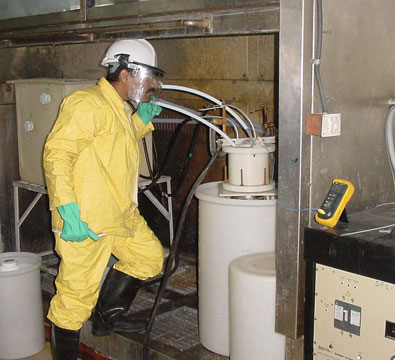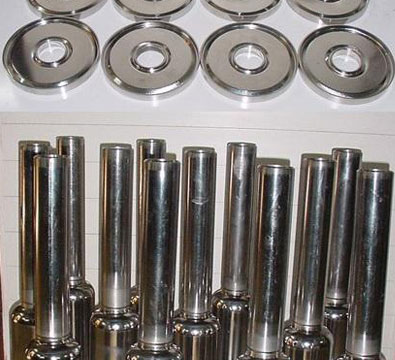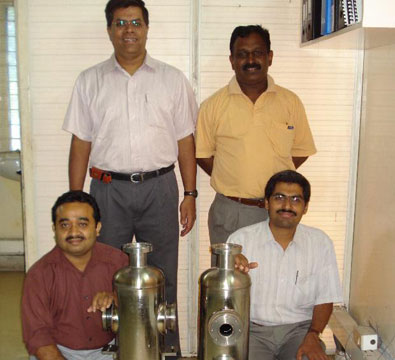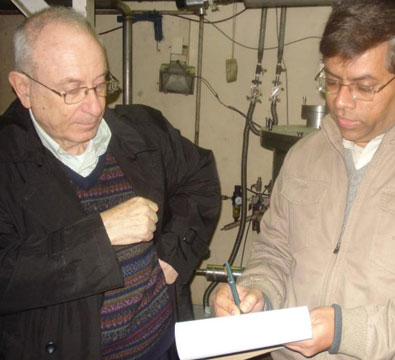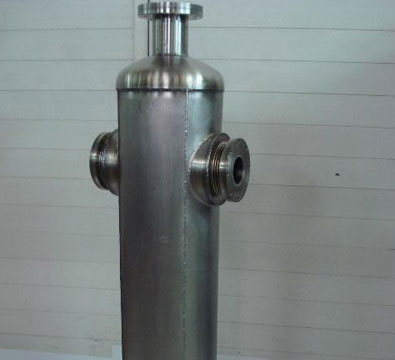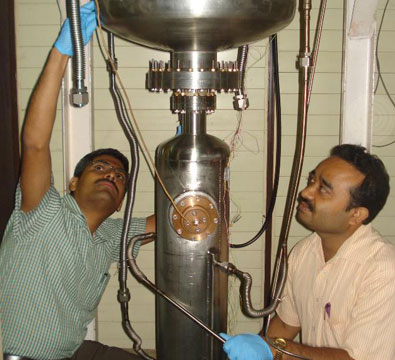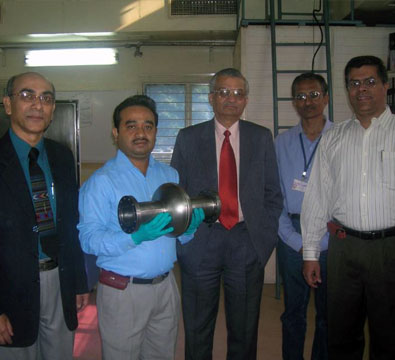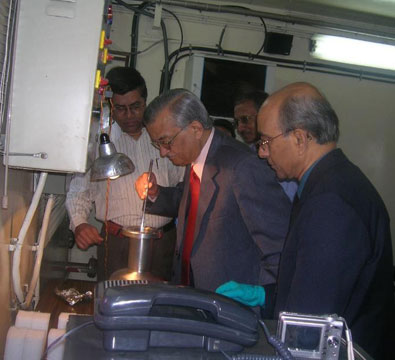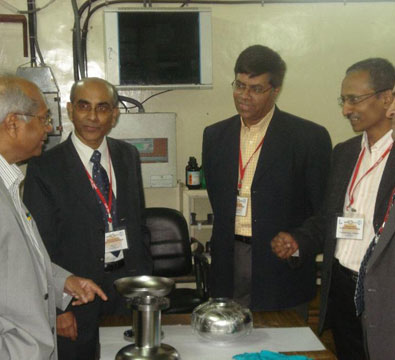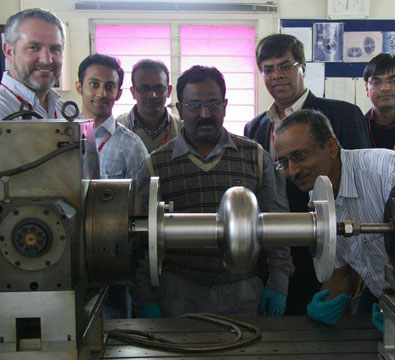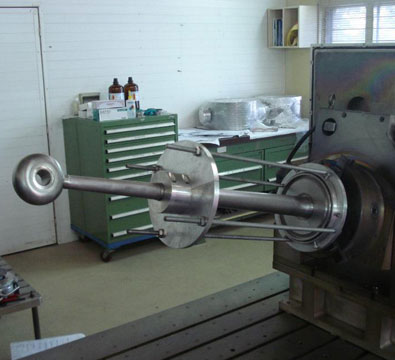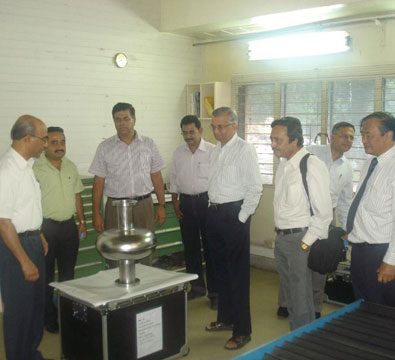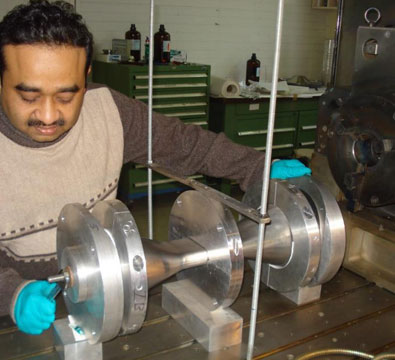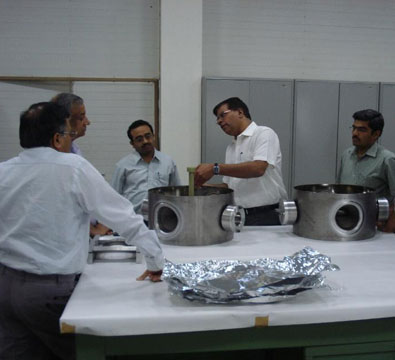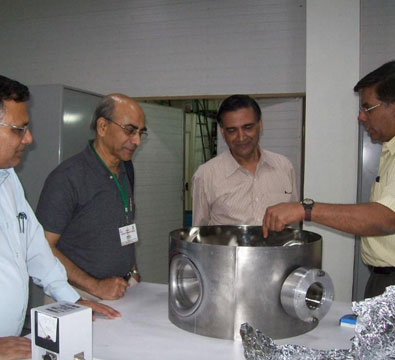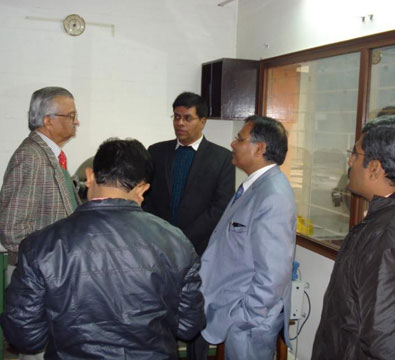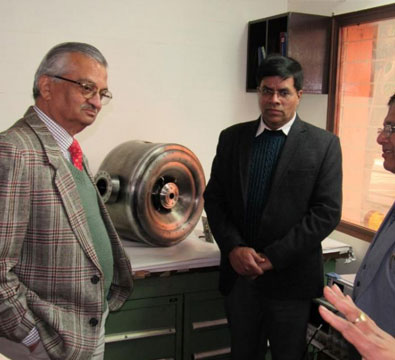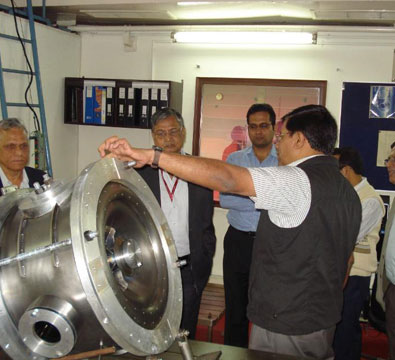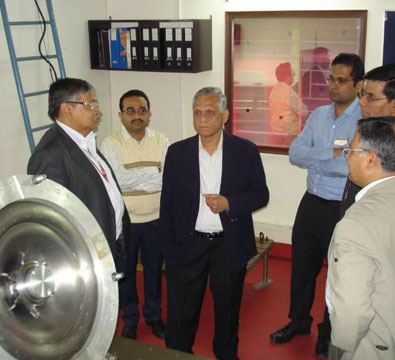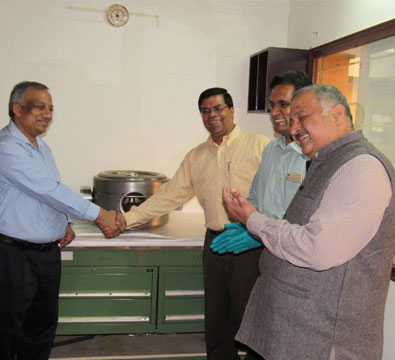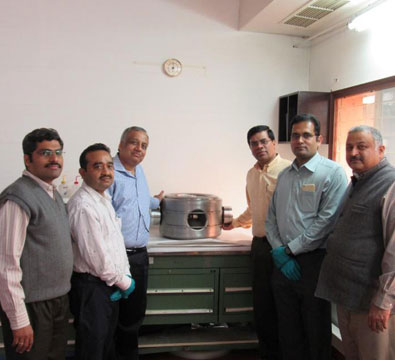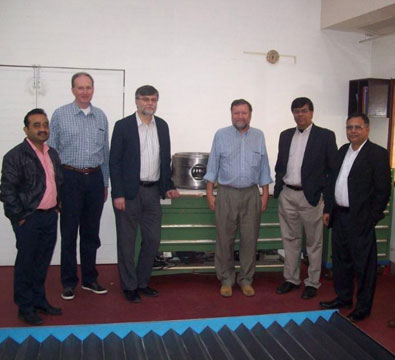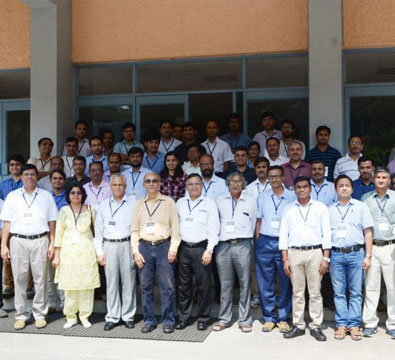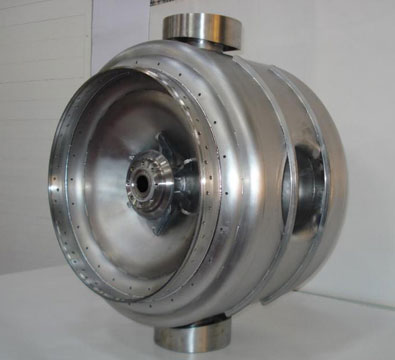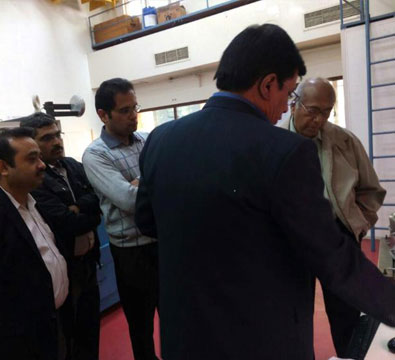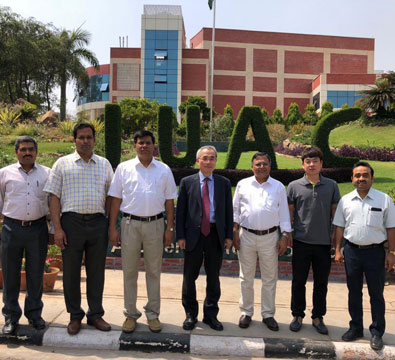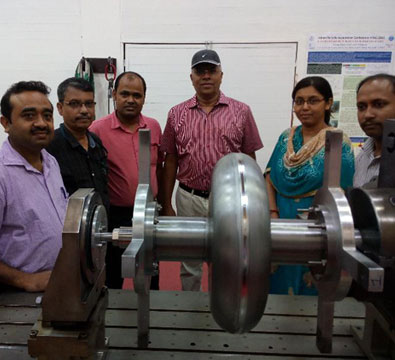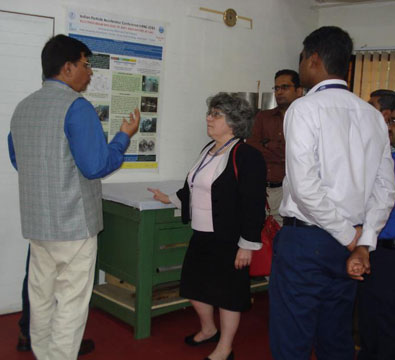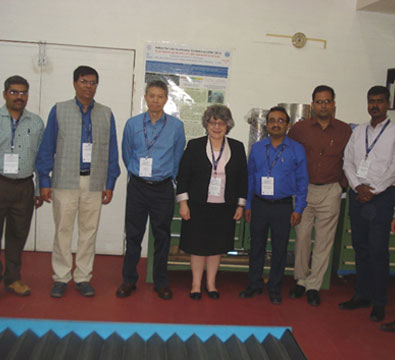अतिचालक रेसोनेटर निर्माण सुविधा
अं.वि.त्व.के.-अतिचालक लिनैक (एस.सी. लिनैक) के लिए प्रोटोटाइप क्वार्टर-वेव रेज़ोनेटर (क्यू.डब्ल्यू.आर.) को आर्गोन नेशनल लेबोरेटरी (ए.एन.एल.) यू.एस.ए. के सहयोग से निर्मित और विकसित किया गया था। ए.एन.एल. में लिनैक के पहले मॉड्यूल के लिए बारह क्यू.डब्ल्यू.आर. का एक बैच भी बनाया गया था। इसके पश्चात अं.वि.त्व.के. में नायोबियम रेज़ोनेटरों के आंतरिक उत्पादन के लिए रेज़ोनेटर निर्माण सुविधाएं स्थापित की गईं। अं.वि.त्व.के. में स्थापित बुनियादी ढांचे के अतिरिक्त, एक स्थानीय विक्रेता की भी पहचान की गई थी और उसकी मानव शक्ति को नायोबियम रेज़ोनेटर के उत्पादन से जुड़े विभिन्न मशीनिंग, फॉर्मिंग, रोलिंग, फिटिंग और फिक्स्चर फैब्रिकेशन कार्यों को करने के लिए उपयुक्त रूप से प्रशिक्षित किया गया था।
1. मूलभूत ढांचा
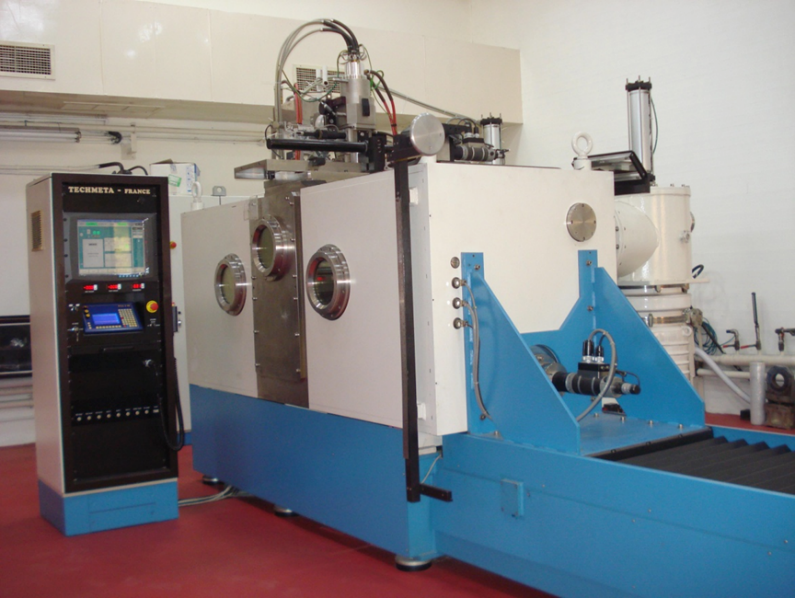
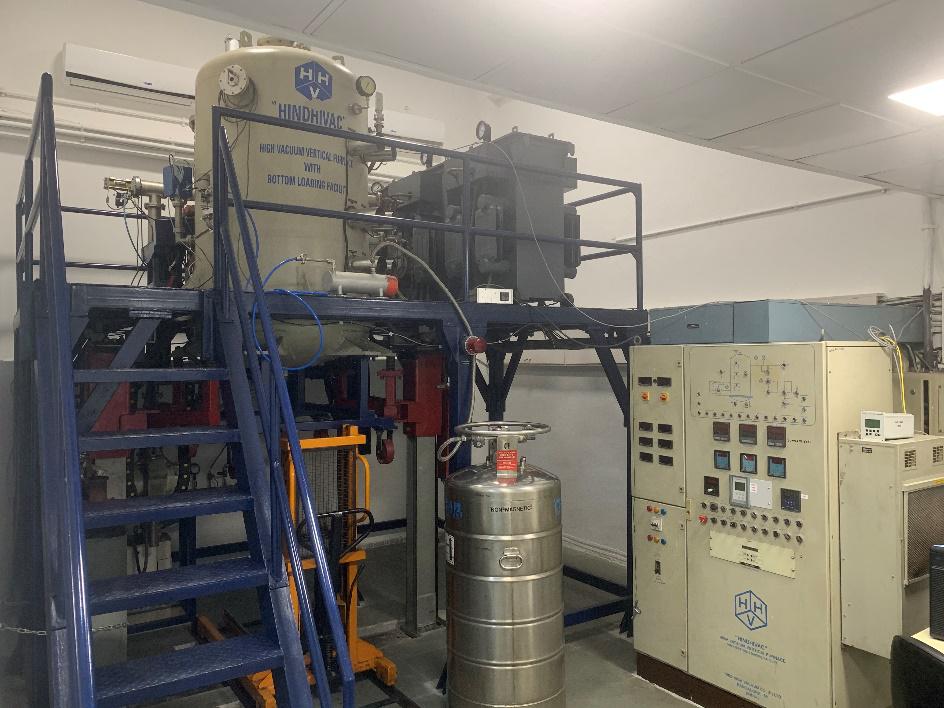
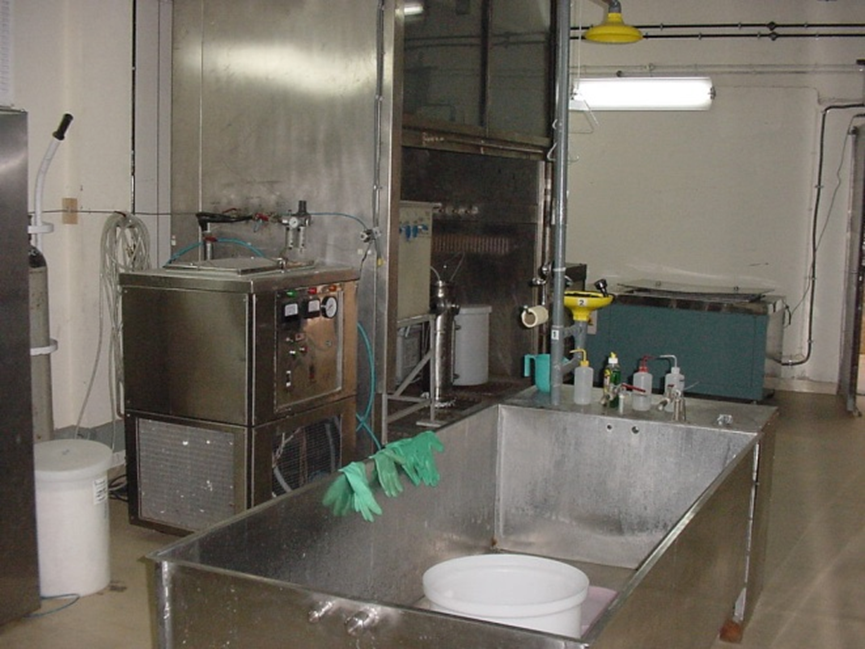
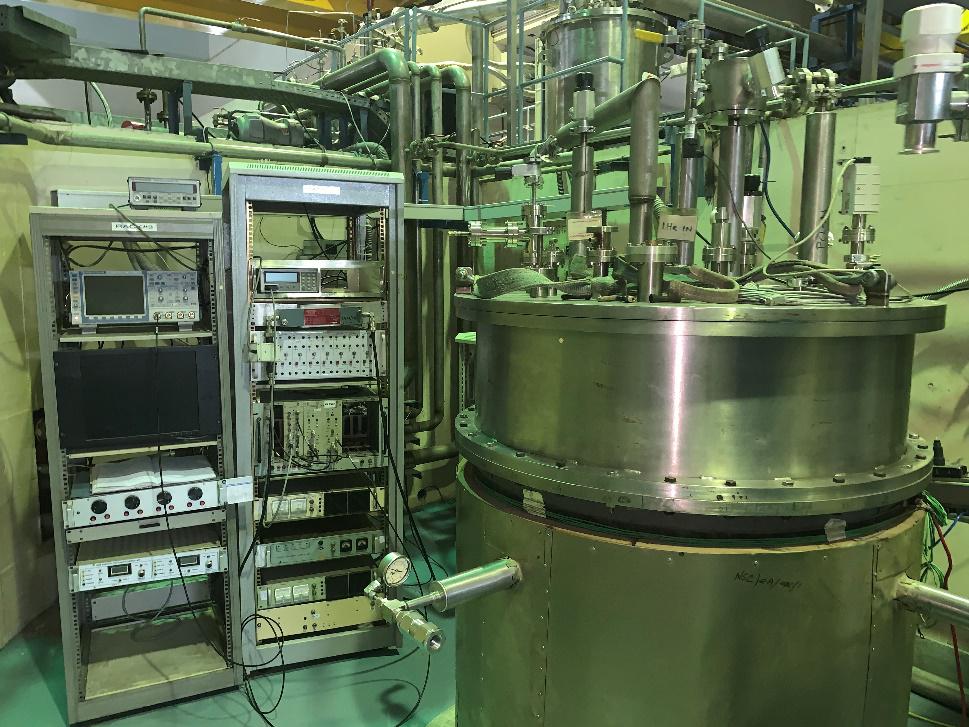
2. रेसोनेटर फैब्रिकेशन
अं.वि.त्व.के. में पहला क्यू.डब्ल्यू.आर. वर्ष 2003 में बनाया गया था। 4.2 K पर एक ठंडे परीक्षण में, यह आसानी से 6 वाट रेडियो आवृत्ति इनपुट शक्ति पर> 4 मेगा वोल्ट प्रति मीटर के नाममात्र डिजाइन लक्ष्य को पार कर गया। (चित्र और परीक्षण परिणाम का लिंक-चित्र 1)। 2004 में अपने मैकेनिकल ट्यूनर के साथ एस.सी. लिनैक के लिए पहला पूर्णतया: स्वदेशी क्यू.डब्ल्यू.आर. सफलतापूर्वक बनाया गया था। (चित्र का लिंक – चित्र 2)। इसके पश्चात दूसरे और तीसरे लिनैक मॉड्यूल के लिए पंद्रह क्यू.डब्ल्यू.आर. और उनके मैकेनिकल ट्यूनर (चित्र 3 के लिए लिंक) का थोक उत्पादन किया गया। ये सभी कैविटीज लिनैक में स्थापित है और पिछले कई वर्षों से नियमित रूप से बीम को त्वरित कर रही हैं। (परीक्षण परिणाम का लिंक – चित्र 4)।
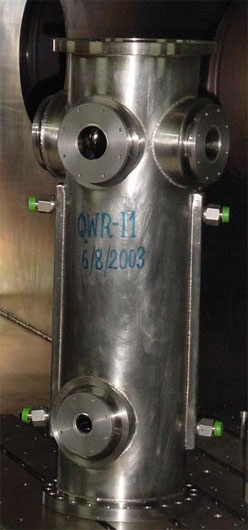
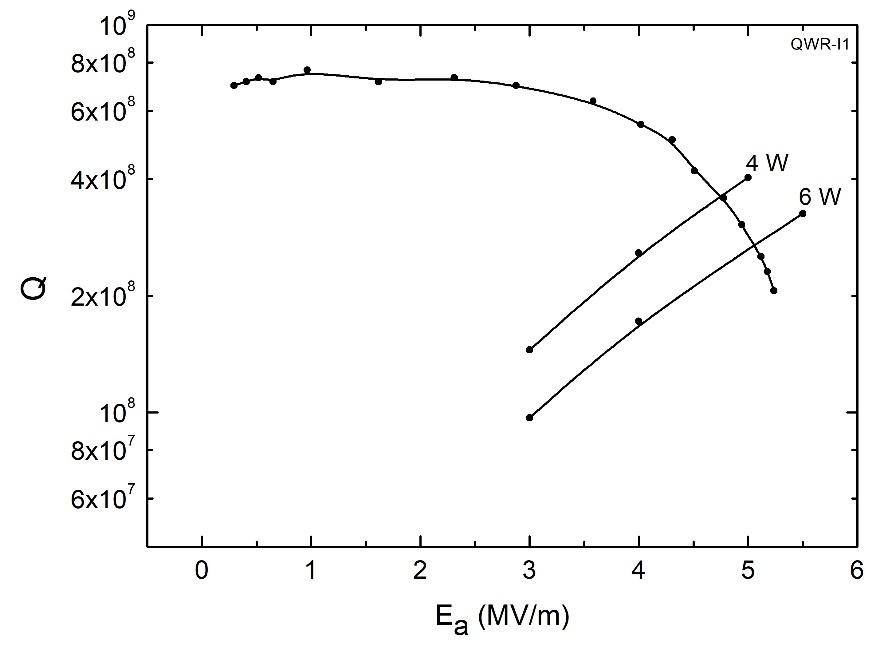
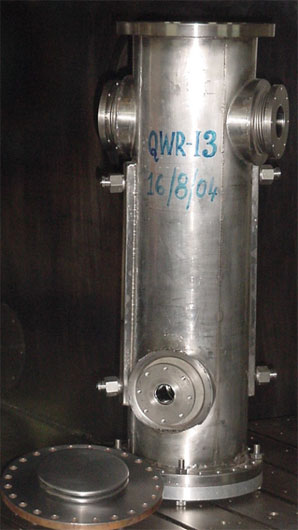
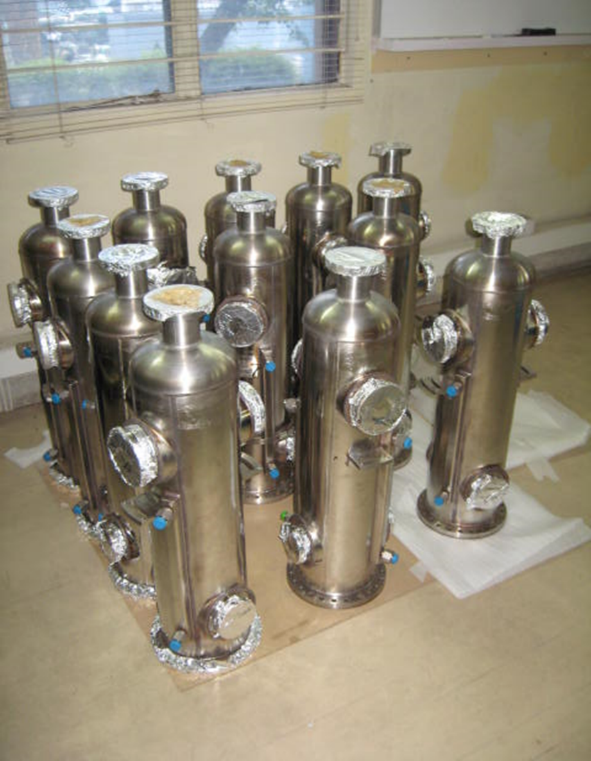
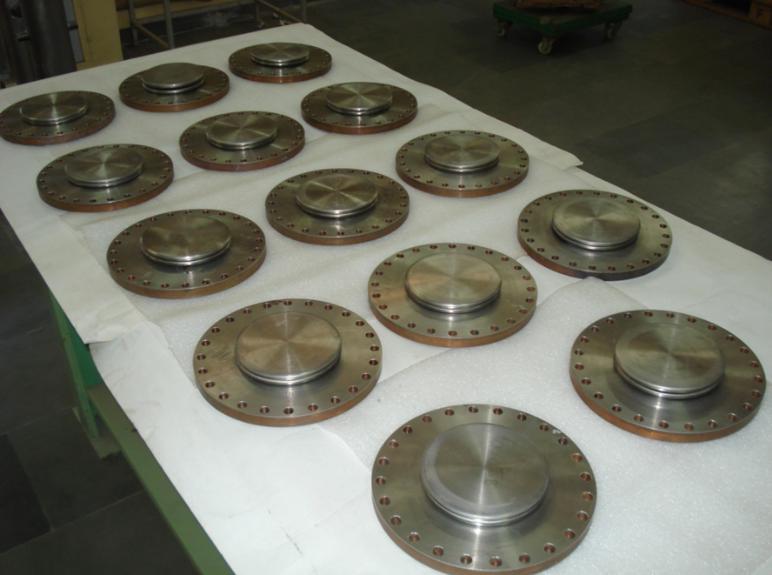
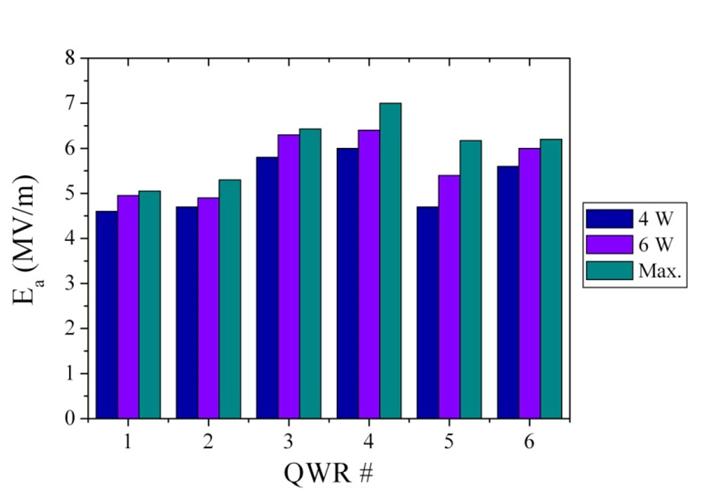
b) निम्न बीटा रेजोनेटर:
अं.वि.त्व.के. में एस.आर.एफ. अवसंरचना का उपयोग करते हुए 97 मेगाहर्ट्ज आवृत्ति पर काम करने वाले एक प्रोटोटाइप β = 0.05 रेजोनेटर को निर्मित और विकसित किया गया है। इस रेजोनेटर का उपयोग अं.वि.त्व.के. में आगामी उच्च प्रवाही अंत:क्षेपक (एच.सी.आई.) में प्रस्तावित निम्न बीटा मॉड्यूल (एच.सी.आई. बीमलाइन चित्र 5 के लेआउट के लिए लिंक) में किया जाएगा। निम्न बीटा मॉड्यूल एस.सी. लिनैक में अंत:क्षेपण से पहले एच.सी.आई. से आयन वेग से बेहतर मिलान करने का काम करेगा। (अगले अनुच्छेद में दिए गए रेजोनेटर डिजाइन विवरण और लिंक देखें)।
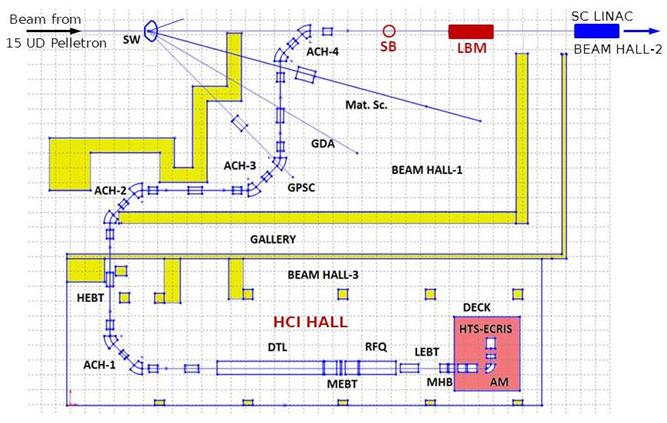
निम्न बीटा रेजोनेटर का विद्युत चुम्बकीय डिजाइन क्यू.डब्ल्यू.आर. डिजाइन की तुलना में एक सुधार है। इसमें टेपर्द सेंट्रल कंडक्टर है जिसके खुले छोर पर एक छोटी डोनट के आकार की ड्रिफ्ट ट्यूब है। (चित्र 6 में योजनाबद्ध और चित्र का लिंक)। क्यू.डब्ल्यू.आर. के विपरीत, ने डिजाइन में ट्रांसमिशन लाइन की कैपेसिटिव लोडिंग बहुत कम होती है, जिसके परिणामस्वरूप कम संग्रहीत ऊर्जा होती है और इसलिए कैविटी का एक फेस नियंत्रण सरल होता है। रेजोनेटर के शीर्ष सतह चुंबकीय क्षेत्र को भी एस.सी. लिनैक-क्यू.डब्ल्यू.आर. में इसके मान के आधे से भी कम कर दिया गया है (तालिका 1 का लिंक)। जिसके फलस्वरूप आर.एफ. सतह पर शिखर चुंबकीय क्षेत्र नायोबियम के लिए महत्वपूर्ण चुंबकीय क्षेत्र से अधिक होने से पहले (जिससे क्वेन्च होता है) यह कैविटी को बहुत अधिक त्वरित प्रवणता (चित्र 7 में परीक्षण परिणामों के लिए लिंक) तक जाने की अनुमति देता है, जिससे एक शमन होता है। इसका मैकेनिकल डिज़ाइन क्यू.डब्ल्यू.आर. के समान है जिसमें नायोबियम रेज़ोनेटर को स्टेनलेस स्टील के हीलियम पात्र द्वारा जैकेट किया जाता है और इसे तरल हीलियम से 4.2 K तक ठंडा किया जाता है। SS से नियोबियम में परिवर्तन एक बार फिर क्यू.डब्ल्यू.आर. की तरह Nb-SS विस्फोटक रूप से बंधे फ्लैंग्स के माध्यम से प्रदान किए जाते हैं। जहां भी संभव हो निम्न बीटा रेजोनेटर के आयामों को क्यू.डब्ल्यू.आर. के समान रखने के लिए यांत्रिक डिजाइन के दौरान ध्यान रखा गया है जिससे ताकि निर्माण में सरलता के साथ-साथ वर्तमान लिनैक क्रायोमॉड्यूल्स के साथ एकत्र किए गए अनुभव से कम बीटा क्रायोमॉड्यूल्स डिजाइन में लाभ हो सके।
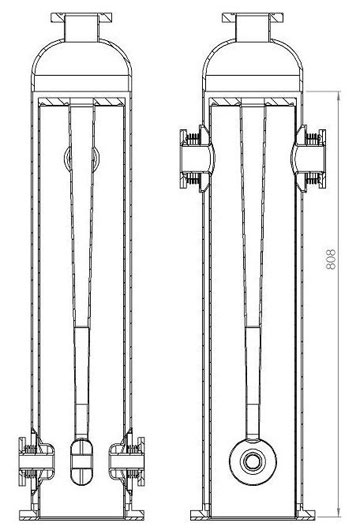
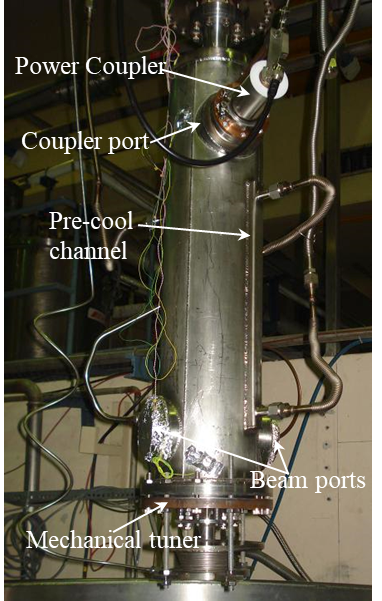
| Operating frequency | 97 MHz |
| Optimum beta (v/c) | 0.05 |
| Stored energy @ 1 MV/m accelerating field | 0.026 J/(MV/m)2 |
| Peak surface magnetic field @ 1 MV/m accelerating field | 6.4 mT |
| Peak surface electric field @ 1 MV/m accelerating field | 3.45 MV/m |
| Geometric factor (QRs) | 16.1 Ω |
| Shunt Impedance (RSh/Q) | 650 Ω |
| Effective accelerating length (Leff) | 104 mm |
| Operating Temperature | 4.2 K |
| Design value of operating accelerating field (Ea) | 6 MV/m |
| Quality factor @ (Ea) | >3X108 |
तालिका 1: निम्न बीटा रेजोनेटर के विद्युत चुम्बकीय पैरामीटर
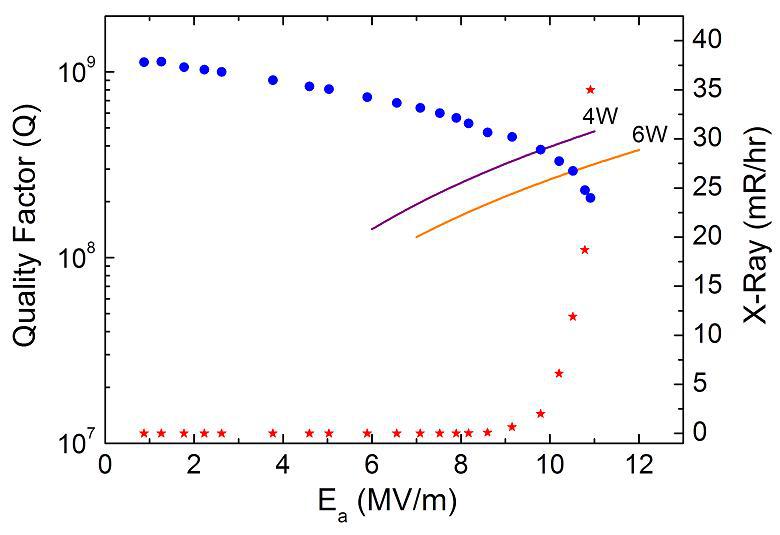
3. सहयोग
अतिचालक लिनैक के लिए क्यू.डब्ल्यू.आर. के विकास और प्रोटोटाइप निम्न बीटा रेज़ोनेटर के डिजाइन और विकास के अतिरिक्त, अं.वि.त्व.के. में एस.आर.एफ. मूलभूत संरचना का बड़े पैमाने पर कई राष्ट्रीय और अंतर्राष्ट्रीय सहयोगी परियोजनाओं के लिए उपयोग किया गया है। …. (और अधिक लिंक)
a) सिंगल स्पोक रिसोनेटर (SSR1):
अं.वि.त्व.के. ने फर्मी राष्ट्रीय त्वरक प्रयोगशाला (एफ.एन.ए.एल.) यू.एस.ए. में पी.आई.पी.-II परियोजना में उपयोग के लिए बेयर नायोबियम एस.एस.आर.1 के दो एकल स्पोक रेजोनटर्स का सफलतापूर्वक निर्माण किया है (और अधिक लिंक)। यह परियोजना दो प्रयोगशालाओं के बीच समझौता ज्ञापन के तहत की गई थी जिसमें एफ.एन.ए.एल. ने रेजोनेटर के लिए डिजाइन ड्राइंग, आवश्यक नायोबियम सामग्री और निर्माण एवं विकास के लिए आवश्यक धन प्रदान किया था। अं.वि.त्व.के. द्वारा एस.आर.एफ. अवसंरचना और उसी विक्रेता के पास उपलब्ध सुविधाओं का उपयोग करके सर्वोत्तम प्रयास के आधार पर काम किया गया था जिसने क्यू.डब्ल्यू.आर. निर्माण के दौरान काम किया था। विभिन्न फिक्स्चर के सभी फॉर्मिंग, रोलिंग, मशीनिंग और फैब्रिकेशन विक्रेता की साइट पर किया गया था, जबकि रेज़ोनेटर भागों और उप-असेंबलियों का सरफेस ट्रीटमेंट और उनकी इलेक्ट्रॉन बीम वेल्डिंग अं.वि.त्व.के. में की गई थी (चित्र 8 का लिंक)। दोनों रेजोनेटर्स (चित्र 9 में पूर्ण एस.एस.आर. 1 रेजोनेटर्स की तस्वीर लिंक) को मार्च 2015 में एफ.एन.ए.एल. को भेज दिया गया था, जहां उन्हें ठंडे परीक्षण से पहले सरफेस ट्रीटमेंट का एक और दौर दिया गया था। दोनों कैविटीज Q0 ≥ 5X109 @10 MV/m @2K के PIP-II डिज़ाइन लक्ष्य को पूर्ण करने में सक्षम थीं। इसके पश्चात, दो कैविटीज में से बेहतर को एक स्टेनलेस-स्टील हीलियम के आवरण के साथ आच्छादित किया गया। जैकेटिंग का काम भाभा परमाणु अनुसंधान केंद्र (बी.ए.आर.सी.) मुंबई में अं.वि.त्व.के. के सहयोग से किया गया था। इसके पश्चात कैविटीज को वापस एफ.एन.ए.एल. भेज दिया गया है जहां उपयुक्त सतह प्रसंस्करण के पश्चात एक और ठंडा परीक्षण किया गया। दूसरे ठंडे परीक्षण का परिणाम कहीं भी निर्मित रेजोनेटर्स के इस वर्ग में प्राप्त सबसे अच्छे रेजोनेटर्स में से एक है (चित्र 10 का परीक्षण परिणाम लिंक)। परिणाम एक स्पष्ट संकेत था कि अं.वि.त्व.के. में अपनाई जाने वाली निर्माण और प्रसंस्करण तकनीकें अंतर्राष्ट्रीय मानकों के बराबर हैं। कैविटीज को तब से बीम त्वरण के लिए पी.आई.पी.-II अंत:क्षेपण परीक्षण प्रयोग (पी.आई.पी.-2 आई.टी.) बीमलाइन में स्थापित किया गया है।
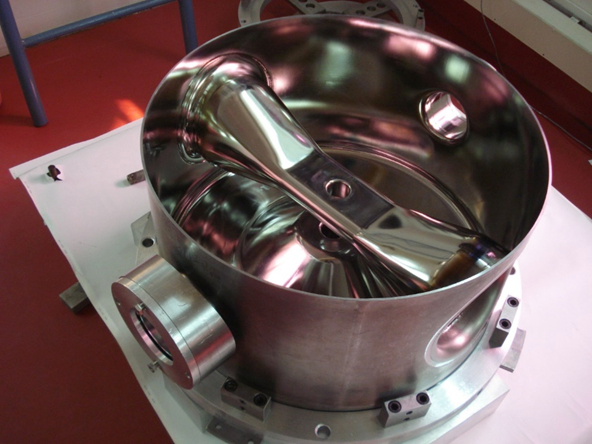
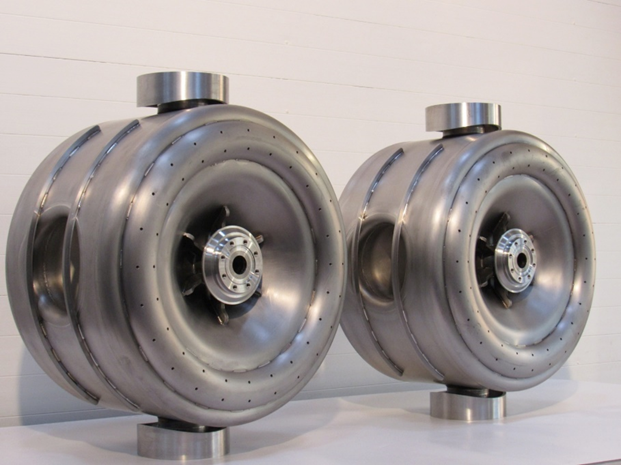
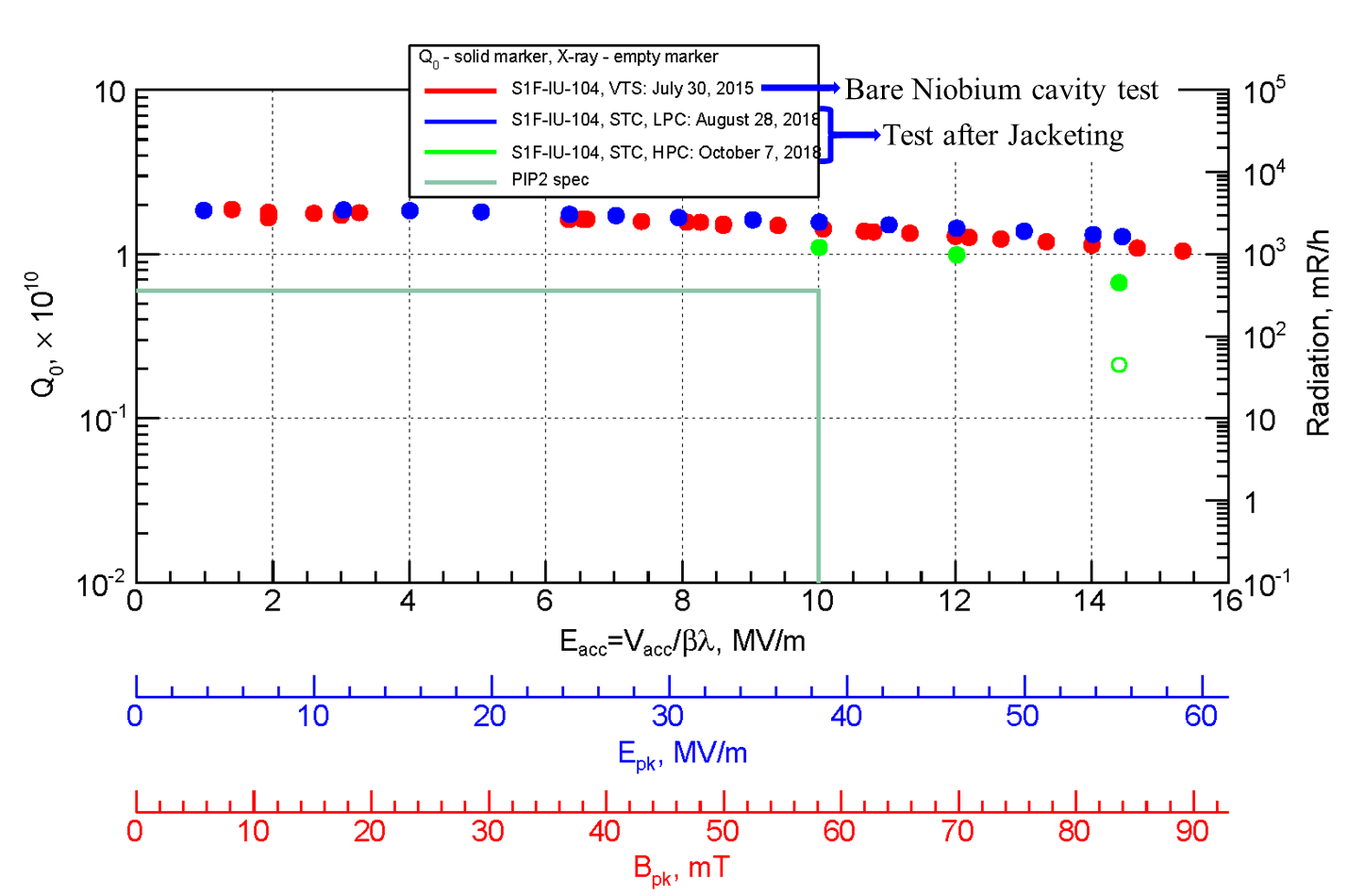
b) आर.आर.सी.ए.टी. इंदौर के सहयोग से एकल-कोष्ठिका और बहु-कोष्ठिका अण्डाकार कैविटीज का विकासः
यह अं.वि.त्व.के. और राजा रमन्ना सेंटर फॉर एडवांस्ड टेक्नोलॉजी (आर.आर.सी.ए.टी.) इंदौर के बीच एक सहयोगी परियोजना थी जिसका उद्देश्य टी.ई.एस.एल.ए. प्रकार की एकल कोष्ठिका और बहु-कोष्ठिका अतिचालक नायोबियम कैविटीज को विकसित करना था। अं.वि.त्व.के. की भूमिका नायोबियम कैविटीज के निर्माण, मशीनिंग और इलेक्ट्रॉन बीम वेल्डिंग के लिए विभिन्न फिक्सचर्स की डिजाइनिंग, वेल्डिंग मापदंडों के विकास और बाद में नायोबियम कैविटीज का इलेक्ट्रॉन बीम वेल्डिंग करने में अपनी विशेषज्ञता साझा करना था। (और अधिक लिंक)
- 1.3 गीगाहर्ट्ज टेस्ला-टाइप एकल-कोष्ठिका और बहु-कोष्ठिका अण्डाकार कैविटीज: कुल चार एकल कोष्ठिका कैविटीज विकसित की गईं। इन्हें एफ.एन.ए.एल. में संसाधित और परीक्षण किया गया था। चारों कैविटीज ने बहुत अच्छा प्रदर्शन किया। कैविटीज में से एक 1.5 X1010 @ 40 MV/m @ 1.8 K की Q0 प्राप्त कर सकता है (चित्र 11 में कैविटी और Q वक्र का चित्र लिंक)| उच्चतम विभव पर कोई एक्स-किरणों का उत्सर्जन नहीं देखा गया। इस परिणाम ने एक बार फिर संकेत दिया कि वेल्ड तैयार करने की प्रक्रिया और अं.वि.त्व.के. में प्राप्त इलेक्ट्रॉन बीम वेल्ड की गुणवत्ता अंतरराष्ट्रीय मानकों के साथ तुलनीय है। एकल कोष्ठिका कैविटीज के परिणामों से प्रोत्साहित होकर, बाद में अं.वि.त्व.के. में ई.बी.डब्ल्यू. सुविधा का उपयोग करके एक पाँच-कोष्ठिका दीर्घवृत्ताकार कैविटी को वेल्डेड किया गया। यह सबसे बड़ा कैविटी का आकार था जिसे ई.बी.डब्ल्यू. मशीन के वेल्डिंग कक्ष के भीतर समायोजित किया जा सकता था। कैविटी ने 1.7 K पर 42 मेगा वॉल्ट प्रति मीटर प्राप्त किया। (चित्र 12 कैविटी चित्र और परीक्षण परिणाम लिंक)|
- 650 मेगाहर्ट्ज, β = 0.9 एकल कोष्ठिका अण्डाकार कैविटी: एक 650 मेगाहर्ट्ज एकल कोष्ठिका कैविटी भी इसी सहयोग के अंतर्गत निर्मित की गई थी। इसे एफ.एन.ए.एल. में भी संसाधित और परीक्षित किया गया था। 2.1 K तापमान पर, कैविटी ने क्वेचिंग से पहले, डिजाइन लक्ष्य से अधिक 19.3 मेगा वोल्ट प्रति मीटर पर 3 X1010 का Q0 हासिल किया। (चित्र 13 कैविटी चित्र और परीक्षण परिणामों लिंक)
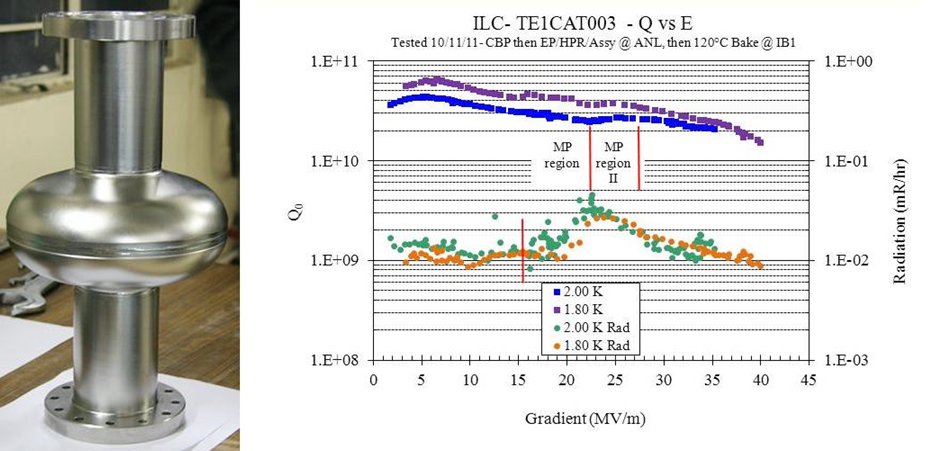
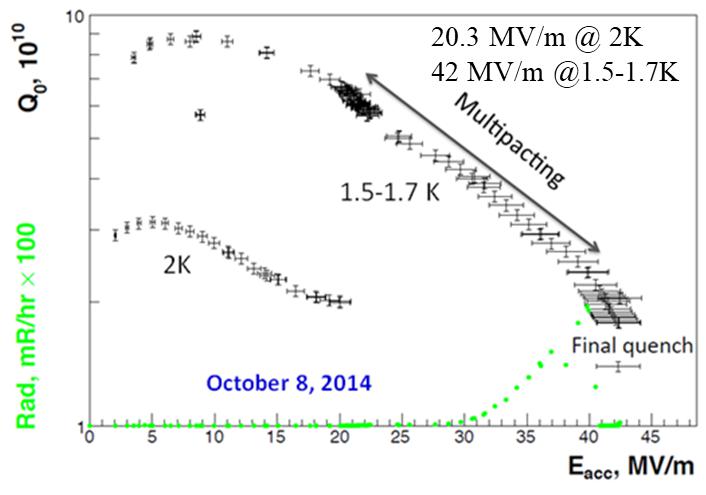
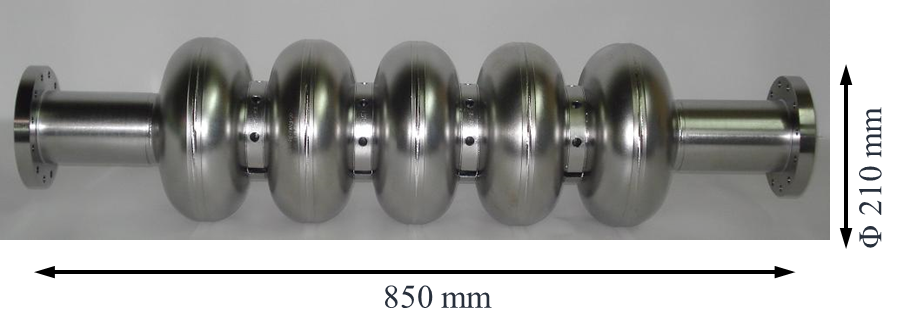
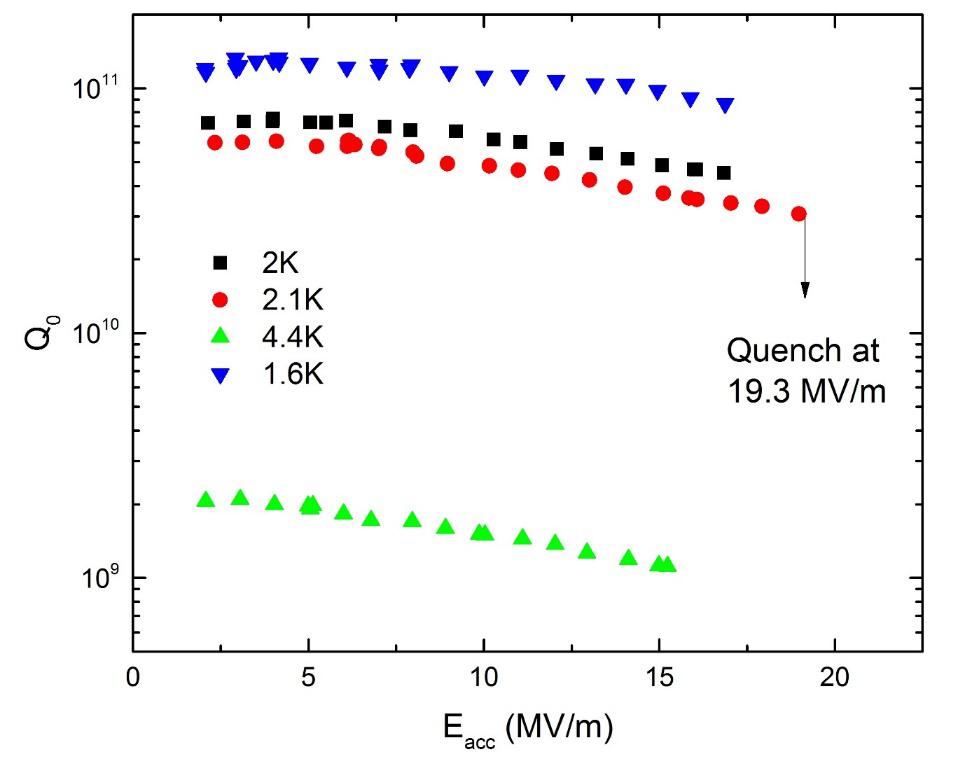
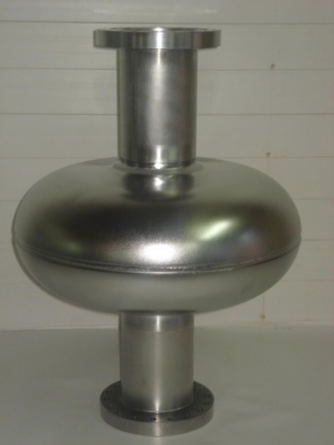
c) वी.ई.सी.सी., कोलकाता के सहयोग से 650 मेगाहर्ट्ज, β = 0.6 एकल कोष्ठिका निम्न बीटा अण्डाकार कैविटी का विकास:
इस सहयोग में भी अं.त्व.वि.के. द्वारा साझा की गई विशेषज्ञता से लाभान्वित होकर वी.ई.सी.सी. द्वारा विभिन्न कैविटी घटकों का निर्माण किया गया है।(और अधिक लिंक)। इसके अतिरिक्त, अं.वि.त्व.के. टीम के परामर्श से वेल्डिंग फिक्स्चर सहित विभिन्न फिक्स्चर का विकास किया गया है।
अं.वि.त्व.के. में वेल्ड पैरामीटर विकास, वेल्ड युग्म की तैयारी और कैविटी घटकों की वास्तविक इलेक्ट्रॉन बीम वेल्डिंग की गई। दो एकल-कोष्ठिका कैविटीज का निर्माण किया गया है। उनमें से एक को फर्मी लैब में संसाधित और परीक्षित किया गया है। इस कैविटी ने बिना किसी क्वेचिंग के 34.5 मेगा वोल्ट प्रति मीटर का त्वरित विद्युत क्षेत्र हासिल किया है, जो कैविटीज के इस वर्ग में एक विश्व कीर्तिमान है (आकृति 14 कैविटी और परीक्षण परिणामों की एक तस्वीर लिंक). दूसरी कैविटीज पूर्ण हो चुकी है और अंतिम प्रसंस्करण और परीक्षण की प्रतीक्षा कर रही है।
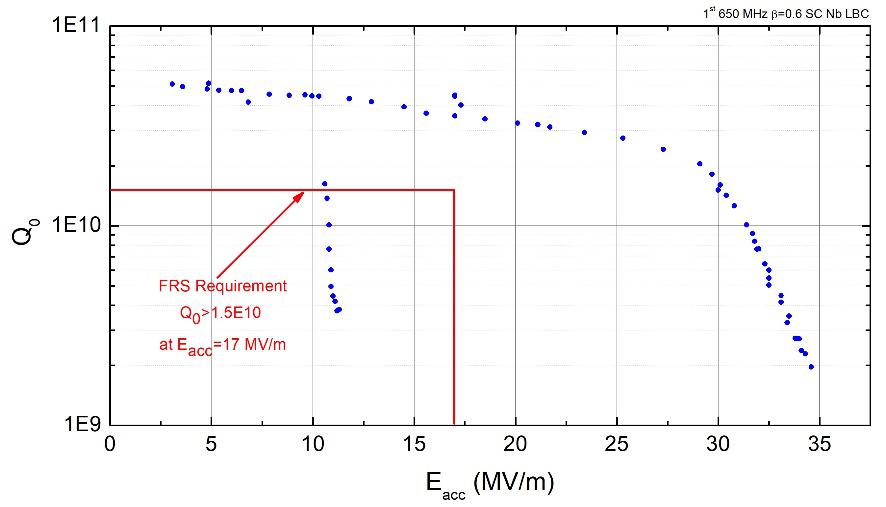
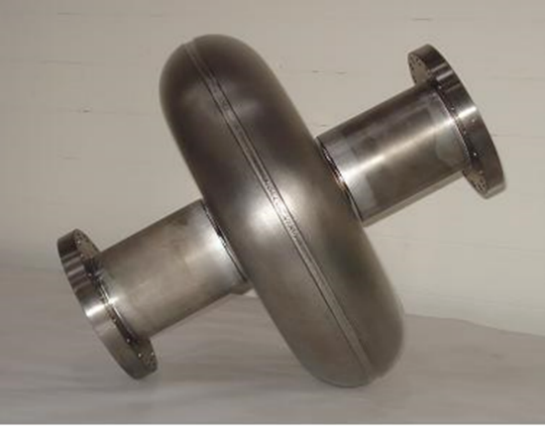
4. QWR प्रदर्शन पर उच्च तापमान गर्मी उपचार के प्रभाव पर अध्ययन
नायोबियम रेज़ोनेटर फैब्रिकेशन और परीक्षण से संबंधित नियमित गतिविधियों के अलावा, एस.आर.एफ. मूलभूत संरचना, विशेष रूप से उच्च निर्वात भट्टी सुविधा और सरफेस प्रीपेरेशन लैब, जैकेट वाले क्यू.डब्ल्यू.आर. पर उच्च तापमान तापोपचार उपचार के प्रभाव पर अध्ययन करने के लिए बड़े पैमाने पर उपयोग किया गया है। (और अधिक लिंक)| अध्ययन के लिए स्वदेशी रूप से निर्मित क्यू.डब्ल्यू.आर. और प्रोटोटाइप निम्न बीटा रेज़ोनेटर में से एक को चुना गया था। दोनों रेज़ोनेटर्स को मानक सरफेस ट्रीटमेंट दिया गया और एक आधारभूत प्रदर्शन परिणाम स्थापित करने के लिए ठंडे परीक्षण किए गए। इसके बाद, उन दोनों को उच्च निर्वात भट्टी में 8 घंटे के लिए 650 डिग्री सेल्सियस पर ताप उपचारित किया गया और उपयुक्त सतह उपचार के बाद फिर से परीक्षण किया गया। दोनों रेज़ोनेटर्स में पर्याप्त सुधार (~ 2.5 का कारक) देखा गया (चित्र 15 में दर्शाये गए Q-E वक्रों का लिंक)| दो अलग-अलग डिजाइनों के रेजोनेटर्स पर इन उत्साहजनक परिणामों ने अं.वि.त्व.के. में मानक सतह उपचार विधि में इस तकनीक को सम्मिलित करने के लिए प्रेरित किया है।
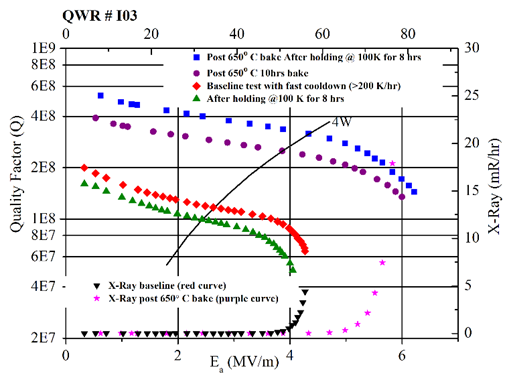
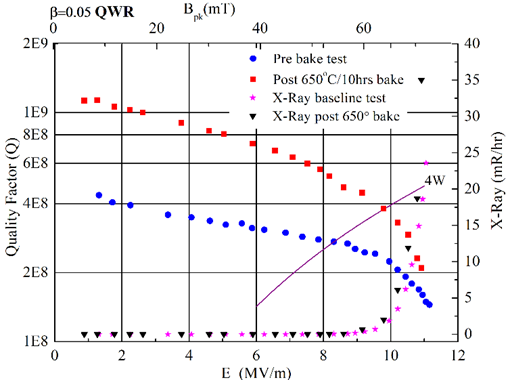
समूह के सदस्य
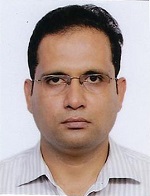
श्री अभिषेक राय (वैज्ञानिक ‘एफ’)
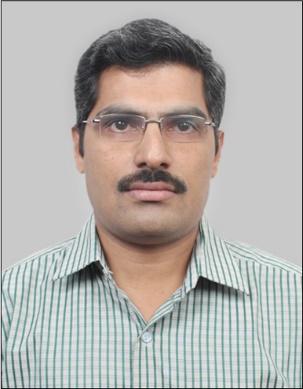
श्री एस. एस. के. सोंटी (कनिष्ठ अभियंता ‘एफ’)
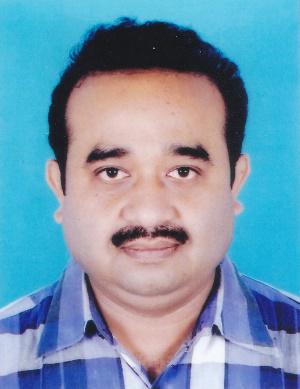
श्री एस. एस. के. सोंटी (कनिष्ठ अभियंता ‘एफ’)
6. Publications – A glimpse
- Improvement of Accelerating Gradients in Niobium Quarter Wave Resonators - A. Rai, P. N. Potukuchi, P. Patra, G. K. Chaudhari, S. S. K. Sonti, J. Karmakar, B. Karmakar, A. Sharma, D. S. Mathuria, A. Pandey, R. N. Dutt, B. K. Sahu, S. Ghosh and D. Kanjilal, Supercond. Sci. Technol. 32 (2019) 095003.
- Investigation of High-Temperature Baking of Niobium Quarter Wave Resonators - A. Rai, P.N. Prakash, S. S. K. Sonti, P. Patra, K.K. Mistri and D. Kanjilal, proceedings of 18th International Conference on RF Superconductivity (SRF), July 17-21, 2017, Lanzhou, China, page 598.
- Test result of 650 MHz, beta 0.61, single-cell niobium cavity - Sudeshna Seth, Sumit Som, Surajit Ghosh, Pranab Bhattacharyya, Aditya Mandal, Sundeep Ghosh, Anjan Dutta Gupta, P. N. Prakash, Kishore Kumar Mistri, Thomas H. Nicol, Allan Rowe, Anna Grassellino, Timergali N. Khabiboulline, Dmitri A. Sergatskov, Oleksandr Stepanovych Melnychuk, Shekhar Mishra, Michael Kelly, Thomas Reid, Proc. of 18th International Conference on RF Superconductivity SRF2017, 17-21 July 2017, Lanzhou, China, p553.
- Cold Tests of SSR1 Resonators Manufactured by IUAC for the Fermilab PIP-II Project - L. Ristori, A. Grassellino, O. Melnychuk, A. Sukhanov, D.A. Sergatskov, P.N. Potukuchi, K. K. Mistri, A. Rai, J. Sacharias, S.S.K. Sonti, proceedings of 17th International Conference on RF Superconductivity (SRF), September 13-18, 2015, Whistler, BC, Canada, page 750.
- Design of 650 MHz, beta=0.61, 5-cell SRF cavity and development of single-cell niobium cavity - Sudeshna Seth……. P.N. Prakash, Proc. of DAE-BRNS Indian Particle Accelerator Conference - InPAC-2015, December 21-24, 2015, TIFR, Mumbai, p383.
- Electron beam welding of SSR1 resonators at IUAC – K.K. Mistri and P.N. Prakash, Proc. of DAE-BRNS Indian Particle Accelerator Conference - InPAC-2015, December 21-24, 2015, TIFR, Mumbai, p804
- Superconducting radio frequency cavities: design, development and results – P.N. Prakash, Proc. of DAE-BRNS Indian Particle Accelerator Conference - InPAC-2013, Nov. 19-22, 2013, VECC, Kolkata, p30.
- Development of 1.3 GHz five cell SCRF cavity – T Maura, A. Yedle, M. Bagre, A. Yadav, A. Puntambekar, R.S. Choudhary, R.S. Sandha, G.V. Kane, J. Dwivedi, A. Mahawar, p. Mohania, K.A.P. Singh, V. Rajput, P. Shrivastava, S. Sharma, R.K. Gupta, G. Mundra, S.C. Joshi, K.K. Mistri and P.N. Prakash, Proc. of DAE-BRNS Indian Particle Accelerator Conference - InPAC-2013, Nov. 19-22, 2013, VECC, Kolkata, p525.
- Development of 650 MHz (β=0.9) single-cell SCRF cavity – M. Bagre, V. Jain, A. Yedle, T. Maurya, A. Yadav, A. Puntambekar, S.G. Goswami, R.S. Choudhary, R.S. Sandha, J. Dwivedi, G.V. Kane, A. Mahawar, P. Mohania, P. Shrivastava, S. Sharma, R. Gupta, S.D. Sharma, S.C. Joshi, K.K. Mistri and P.N. Prakash, Proc. of DAE-BRNS Indian Particle Accelerator Conference - InPAC-2013, Nov. 19-22, 2013, VECC, Kolkata, p401.
- Design of a superconducting low beta niobium resonator - Prakash N. Potukuchi and Amit Roy, PRAMANA Journal of Physics, Vol. 78, No. 4, April 2012, pp. 565-584.
- Superconducting low beta niobium resonator for heavy ions - Prakash N. Potukuchi et al., Proc. of 26th International Linear Accelerator Conference – LINAC2012, Sept. 9-14, Tel Aviv, Israel, p588.
- Superconducting properties of niobium after electron beam welding – Prakash N. Potukuchi, L.S. Sharath Chandra, M.K. Chattopadhyay, D. Kanjilal, Amit Roy and S.B. Roy, Phys. Rev. ST – AB 14, 122001 (2011).
- Development of 1.3 GHz prototype niobium single-cell superconducting cavity under IIFC collaboration – A. Puntambekar, M. Bagre, V. Jain, R. K. Gupta, R. S. Sandha, G. V. Kane, S. D. Sharma, J. Dwivedi, P. Shrivastava, S. C. Joshi, P. D. Gupta, V. C. Sahni, P. N. Potukuchi, J. Sacharias, K. K. Mistri, D. Kanjilal, T. Khabiboulline, A. Rowe, C. Cooper, J. Ozelis, M. Foley, S. Mishra, Proc. of 2011 Particle Accelerator Conference PAC’11, March 28-April 01, 2011, Brookhaven National Laboratory, New York, USA, p871.
- Single cell SCRF cavity development in India – A. Puntambekar, J. Dwivedi, P. Shrivastava, S. C. Joshi, G. Mundra, P. D. Gupta, P. N. Potukuchi, T. Khabiboulline, A. Rowe, C. Cooper, J. Ozelis, M. Foley, S. Mishra, G. Wu, Proc. of 15th International Conference on RF Superconductivity SRF2011, July 25-29, 2011, Chicago, USA, p659.
- SRF Activities at IUAC – Prakash N. Potukuchi, Proc. of DAE-BRNS Indian Particle Accelerator Conference InPAC2011, Feb. 15-18, 2011, Inter-University Accelerator Centre, New Delhi.
- Superconducting low beta resonator for the high current injector at IUAC – Prakash N. Potukuchi and Amit Roy, Proc. of DAE-BRNS Indian Particle Accelerator Conference InPAC2011, Feb. 15-18, 2011, Inter-University Accelerator Centre, New Delhi.
- Superconducting cavity tests at IUAC: Lessons learnt and subsequent improvements – A. Rai, S. Ghosh, P. Patra, G.K. Chaudhari, A. Pandey, B.K. Sahu, D.S. Mathuria, R.N. Dutt, J. Antony, R. Kumar, S.S.K. Sonti, K.K. Mistri, J. Zacharias, P.N. Prakash, D. Kanjilal and A. Roy, Proc. of DAE-BRNS Indian Particle Accelerator Conference InPAC2011, Feb. 15-18, 2011, Inter-University Accelerator Centre, New Delhi.
- Indian cavity fabrication facility and test results – P.N. Potukuchi, Proc. of 14th International Conference on RF Superconductivity SRF 2009, Sept. 20-25, Berlin, Germany, p502.
- Fabrication of superconducting niobium resonators at IUAC – P.N. Potukuchi, K.K. Mistri, S.S.K. Sonti, J. Zacharias, A. Rai, D. Kanjilal and A. Roy, Proc. of 11th International Conference on Heavy Ion Accelerator Technology, HIAT 09, 8-12 June 2009, Venice, Italy, p266.
- Superconducting Niobium Resonator Fabrication at IUAC - P.N. Prakash, K.K. Mistri, S.S.K. Sonti, J. Zacharias, A. Rai, D. Kanjilal and A. Roy, Proceedings of InPAC-2009, Feb 10-13, 2009, RRCAT, Indore.
- Superconducting niobium resonator fabrication and testing at IUAC – P.N. Prakash, S.S.K. Sonti, K.K. Mistri, J. Zacharias, D. Kanjilal and A. Roy, Proc. of Asian Particle Accelerator Conference APAC-2007, Jan. 29-Feb. 2, 2007, Raja Ramanna Centre for Advanced Technology, Indore, p500.
- Production of superconducting Nb QWRs at IUAC – S.S.K. Sonti, K.K. Mistri, J. Zacharias, P.N. Prakash, D. Kanjilal and A. Roy, proc. of DAE-BRNS Indian Particle Accelerator Conference InPAC-2006, Nov. 1-4, 2006, Bhabha Atomic Research Centre, Mumbai, p139.
- Fabrication of superconducting niobium cavities at Nuclear Science Centre – P.N. Prakash, J. Zacharias, K.K. Mistri, S.S.K. Sonti and A. Roy, Proc. of Asian Particle Accelerator Conference APAC 2004, March 22-26, 2004, Gyeongju, Korea, p684.
- Surface preparation of niobium superconducting QWR – R. Mehta, P.N. Prakash, G.K Chaudhari, S. Ghosh, S.S.K. Sonti, A, Rai, D.S. Mathuria, J. Antony, K.K. Mistri and A. Roy, Proc. of Indian Particle Accelerator Conference InPAC 2005, March 1-5, 2005, Variable Energy Cyclotron Centre, Kolkata, p529
- Superconducting resonator fabrication facility (SuRFF) at Nuclear Science Centre – P.N. Prakash, J. Zacharias, S. Ghosh, R. Mehta and A. Roy, Proc. of Symposium on Electron Beam Technology and Applications (SEBTA 2000), Nov. 22-24, 2000, Bhabha Atomic Research Centre, Mumbai, p143.
Media Gallery
Photos of various niobium cavities/components etc. and visits by eminent national and international persons.
अद्यतन की तिथि 26/11/2024




